1553 Ivan the Terrible's illness and the crisis of power
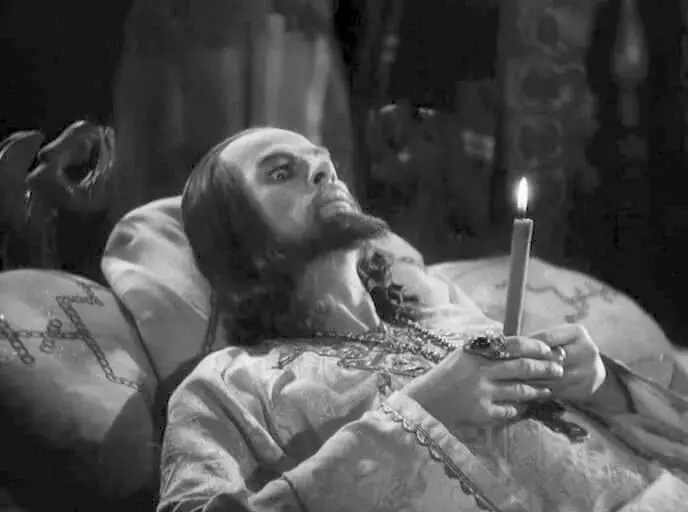
Seriously ill Ivan IV in S. Eisenstein’s film “Ivan the Terrible”
In March 1553, our country once again found itself at a crossroads, and its story could well have gone some other way.
This was due to the serious illness of Ivan IV, which some researchers hastened to declare a simulation: supposedly the tsar needed this “performance” only to identify disloyal boyars - and, of course, to deal with them.
True, these “traitors” had to wait a very long time for reprisals. Archpriest Sylvester, for example, waited for 7 years. And some boyars even 10 years before the establishment of the oprichnina. But Ivan the Terrible, apparently, was in no hurry. Today we will talk a little about this episode in the history of our country.
The king's illness
On March 1, 1553, a few months after returning from the victorious Kazan campaign, Ivan IV suddenly became seriously ill. And he was very young - he was not yet 23 years old.
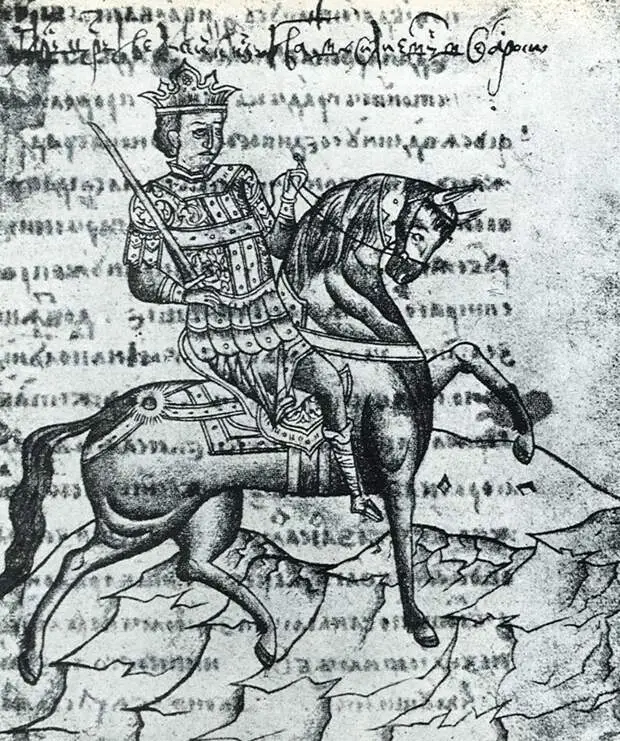
Ivan IV, miniature from the Kazan Chronicle
What kind of disease it was, historians are still guessing, it is only clear that it was some kind of acute infectious disease, accompanied by high fever and severe intoxication:
The king rapidly weakened and soon could barely speak. Already on March 11, everyone began to expect his imminent death.
Candidates for the role of the new king
So, the question of the heir to the Moscow throne arose “in full force.” Ivan IV already had a son, Dmitry. The Tsar's firstborn was born in October 1552; on June 4, 1553, he drowned on the way to the Kirillo-Belozersky Monastery. But while Dmitry was still alive.
Another thing is that many boyars did not want to swear allegiance to an infant, reasonably believing that power would be in the hands of the Zakharyin clan. The interests of the baby were predictably protected by representatives of this family, including Tsarina Anastasia, the first wife of Ivan IV, and her brother Daniil.
But other boyar families did not want the power of the Zakharyins; their opinion was expressed by the okolnichy Fyodor Adashev, the father of Alexei, a member of the “Chosen Rada”:
The influential boyar Ivan Mikhailovich Shuisky was also against the oath to Dmitry, who stated:
Archpriest Sylvester also took their side. They insisted on an oath to the tsar’s cousin, appanage prince Vladimir Andreevich Staritsky, who was then 19 years old.
There was, however, one more royal relative - Ivan IV’s younger brother Yuri, but he was deeply disabled, about whom Andrei Kurbsky wrote:
In the chronicles, Yuri is called “unthoughtful and simple.”
In general, we have already said everything about the infant Tsarevich Dmitry Ivanovich; there is nothing special to add.
Let's say a few words about his rival, another contender for the throne - Vladimir Andreevich Staritsky.
The cousin of Ivan IV was born in 1535, that is, he was 5 years younger than the Tsar. His father was the youngest son of Ivan III and Sophia Paleologus, his mother, Efrosinya Khovanskaya, was descended from the Lithuanian prince Gediminas. At the time of marriage, she was 17 years old, her husband was 43: such a large age difference is explained by the fact that Vasily III, whose marriage with Solomonia Saburova was childless, and then Elena Glinskaya could not give birth for another 4 years, forbade his brothers to marry until then until he has an heir.
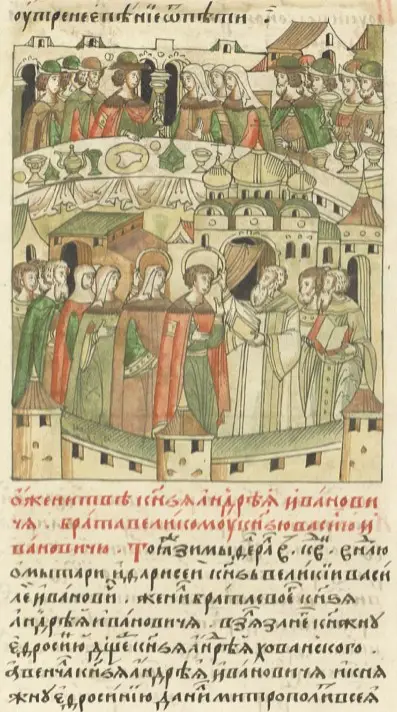
Marriage of Andrei Ivanovich Staritsky to Efrosinia Khovanskaya. Miniature of the Facial Vault
In May 1534, Andrei Staritsky quarreled with Elena Glinskaya over what he considered to be an unfair division of land. And his brother Georgy (Yuri) was also arrested in Moscow, where he was starved to death. In 1537, the ruler ordered him to appear with her nobles in Kolomna, where an army was gathering to repel the expected Tatar invasion. Andrei did not show up, saying he was ill, which aroused great suspicion in Elena, since there were rumors that the Staritsa prince was negotiating with the Moscow and Novgorod boyars about removing her young son from power. A letter from Andrei Staritsky to Novgorod has been preserved, containing the following words:
Having received a repeated order to appear in Moscow, Andrei Staritsky, taking his wife and son with him, tried to escape either to Novgorod or to Lithuania.
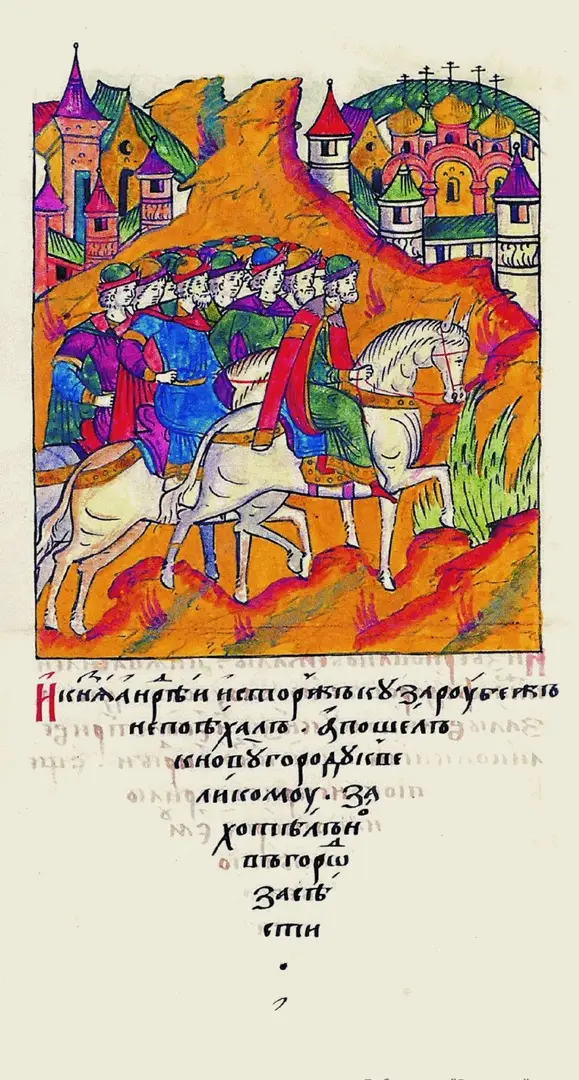
The flight of Andrei Staritsky to Novgorod, miniature of the Front Vault: “Prince Andrei from Torzhok... went to Novgorod the Great, wanted to settle in Novgorod.”
The fugitives were captured (Andrei gave up resistance after he was threatened with a church curse from Metropolitan Daniel), the Staritsa prince was sent to prison, where he died - in December 1537, and was buried with honors in the Archangel Cathedral of the Kremlin.
The Staritsky boyars and “children of the boyars” who accompanied Andrei were also arrested, and 30 of them were hanged. Efrosinya Staritskaya was placed under supervision in the Bersenevsky courtyard, which was transferred to the Moscow kings. And their son Vladimir was given to the care of the gunsmith Fyodor Karpov, who began his service under Ivan III, the grandfather of Ivan and Vladimir.
After the death of Elena Glinskaya, Efrosinya Staritskaya was released, and then she was given her son, to whom the appanage lands were soon returned. Before the birth of Ivan IV’s son Dmitry, mentioned above, it was Vladimir Staritsky who was considered the heir to the throne.
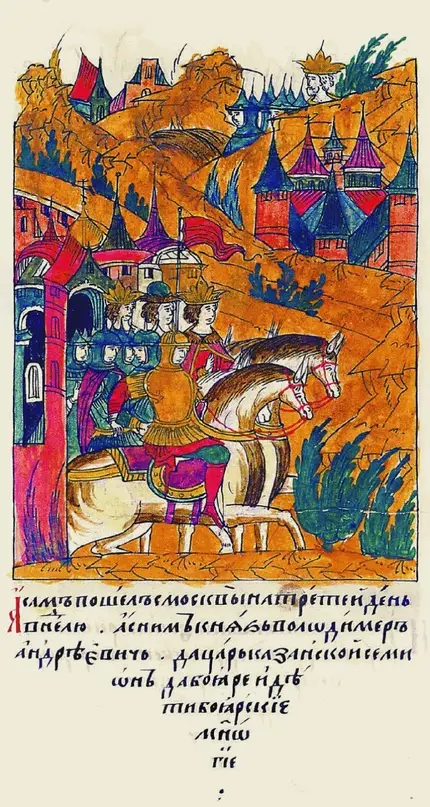
Ivan the Terrible, Simeon Kaschaevich (former Khan of Kazan, who transferred to the Russian service) and Vladimir Andreevich Staritsky speak at Devlet Giray, a miniature of the Facial Vault
Vladimir occupied a fairly prominent position at court. It is known that he was a thousand at the wedding of Tsar Ivan and Anastasia Zakharyina, despite his young age, he sat in the Duma and at the Stoglavy Cathedral, and during the Second Kazan Campaign he was the royal governor in Moscow.
In May 1550, Vladimir married Evdokia Alexandrovna Nagaya (in April 1555 he would enter into a second marriage - with Maria Odoevskaya, cousin of Andrei Kurbsky). He took part in the decisive assault on Kazan and was one of the first to enter this city.
In general, he seemed to many then to be a much more suitable candidate for the role of tsar than the infant Dmitry Ivanovich. And we remember that at one time Andrei Staritsky, Vladimir’s father, seduced the Novgorodians to come under his hand, citing precisely the youth of Ivan IV.
Election of a successor
In response to Ivan IV’s demand to swear allegiance to Dmitry, “there was a lot of fighting, screaming, noise between the boyars.”
The king reproached them:
Nevertheless, by the evening of that day, many boyars swore allegiance to Dmitry.
Pyotr Shchenyatev-Partikeev, Semyon Rostovsky and Ivan Turuntai-Pronsky continued to persist. Vladimir Staritsky also refused to “kiss the cross.”
Moreover, detachments of Staritsa nobles were summoned to Moscow, and the frightened tsar forbade his cousin to be allowed into his palace. Ivan IV turned to the Zakharyins and other supporters of Dmitry. Here is how V. Solovyov conveys his speech:
The next day, the tsar fell completely ill, and the remaining boyars were sworn in to Dmitry in his place by the princes Mstislavsky and Vorotynsky. Although reluctantly, the last “refuseniks” swore the oath. At the same time, Prince Ivan Turuntai-Pronsky reproached Vorotynsky:
The last to “kiss the cross” were Prince Kurlyatev and Treasurer Funikov. Vladimir Staritsky was also forced to take the oath. Most of the trouble was with his mother:
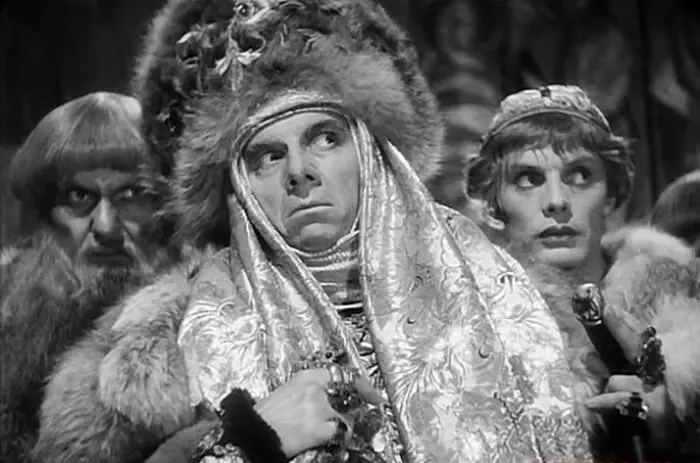
This is how Efrosinya Staritskaya was seen by the audience of the famous film by S. Eisenstein “Ivan the Terrible”, on the right behind her is Vladimir Staritsky
And Ivan IV suddenly quickly began to recover. And, as we have already said, he lost his son while going on pilgrimage. Vladimir Staritsky again became the heir to the throne, but did not remain so for long. Queen Anastasia gave birth to three children - a son, Ivan (March 28, 1554), a daughter, Evdokia (February 26, 1556, she died in infancy) and Fyodor (May 11, 1557).
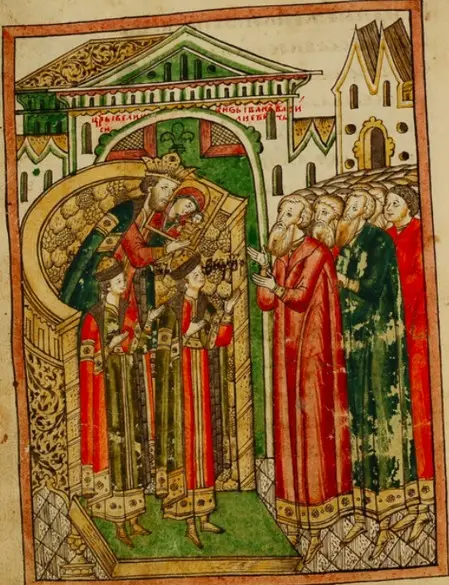
Ivan IV, princes Ivan and Fyodor with the Kazan Icon of the Mother of God, miniature from “The Tale of the Kazan Icon of the Blessed Virgin Mary with the Service”
And in October 1582, the last child of Ivan IV was born - son Dmitry.
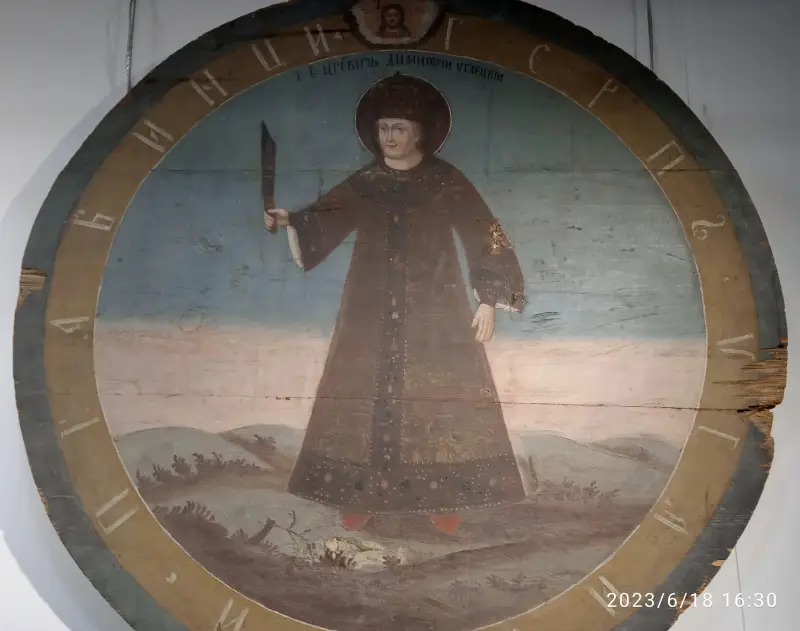
Image of Tsarevich Dmitry in the museum of the city of Uglich, photo by the author
Let us note that this son of Ivan IV was born from the seventh wife of this tsar, Maria Nagaya, while the church recognizes only three marriages as legal. And therefore, Dmitry, in essence, was illegitimate, had no rights to the throne and was excluded (along with all his relatives) from the list of royal persons. He was even expelled from Moscow to the city of Uglich and its environs given to him “to feed” - thus, he was an appanage prince, like Vladimir Staritsky.
Fyodor Ioannovich was married to Boris Godunov’s sister Irina. Tsar Fedor had known his wife since childhood, loved her very much, and she completely controlled her feeble-minded husband. At the time of Dmitry’s death, Fyodor Ioannovich was not even going to die - he would live another 7 years, Irina would still have time to give birth to his daughter Feodosia (and could have given birth to a boy).
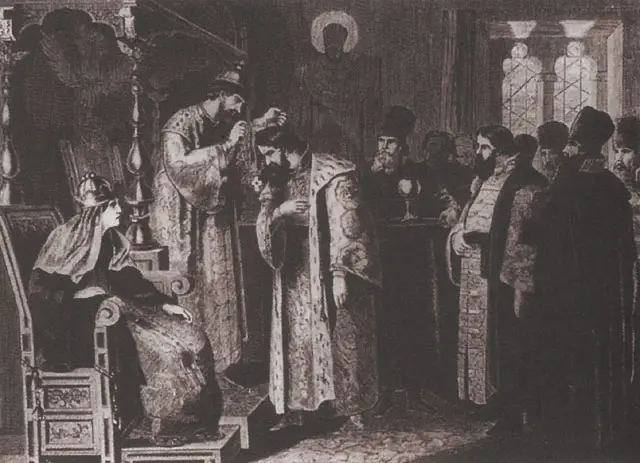
A. Kivshenko. “Tsar Fyodor Ioannovich puts a gold chain on Boris Godunov.” Irina Godunova sits on the throne nearby
And therefore, Boris Godunov in May 1591 had neither reason nor reason to kill Dmitry of Uglich.
Doomed Dynasty
But three sons were not enough to ensure the future of the dynasty.
Ivan Ivanovich died in Aleksandrovskaya Sloboda on November 19, 1581, and his death is shrouded in mystery. Most people, following Karamzin and Repin, are sure that the prince was killed by his father - either when he tried to intercede for his wife (the third in a row), or when he was accused of treason after he demanded to give him an army to march on Pskov ( “taught to talk about rescuing the city of Pskov”).
However, since 1903, serious historians, following Academician N.P. Likhachev, believe that Ivan Ivanovich died of natural causes - after an illness that lasted 11 days. In 1963, an examination of the remains of this prince showed a 32-fold excess of mercury, lead and arsenic, which gave rise to allegations of his poisoning.
However, all these elements were part of medicines widespread in Europe, and at the court of Ivan the Terrible, as you know, foreign doctors practiced. The most famous of them was Elisius Bomelius, who even became a character in the drama of the popular XNUMXth-century Russian poet, translator and playwright L. A. Mei and the opera “The Tsar’s Bride” by N. A. Rimsky-Korsakov, based on it.
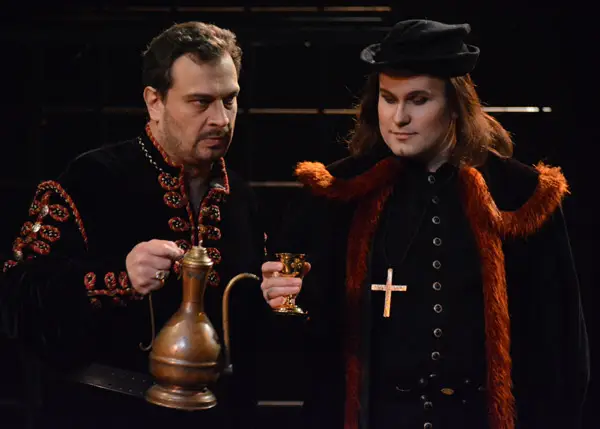
Elisey Bomeliy and Grigory Gryaznoy on the stage of the Helikon-Opera theater
True, Bomeliy came to Moscow in 1570 and had nothing to do with the treatment of Tsarevich Ivan.
Fyodor Ivanovich was proclaimed Tsar by the Zemsky Sobor in 1584, but all contemporary sources speak of the mental inferiority of this son of Ivan the Terrible. Swedish King Charles IX, for example, wrote:
The Polish envoy Lev Sapega, who saw Fyodor Ivanovich, stated:
The father himself was recognized as incapable of governing the state and therefore ordered the establishment of a guardianship council, which included I. F. Mstislavsky, I. P. Shuisky, N. R. Yuryev, B. F. Godunov and B. Ya. Belsky.
In the end, as we know, the country was actually led by Boris Godunov. His sister Irina, the wife of Fyodor Ioannovich, after the death of Tsarevich Dmitry, gave birth to a daughter named Theodosia. It was this girl who became the last representative of the Rurik dynasty. But Theodosia died at the age of two - at the beginning of 1594. And Fedor himself died in January 1598. If Vladimir Staritsky had not been killed in October 1569 on the orders of Ivan IV, he would have been the undisputed heir to the throne.
And Dmitry Uglichsky died 7 years before the death of Fedor - on May 15, 1591. The commission of inquiry concluded that the cause of his death was bleeding caused by a knife wound (or “poke”) that he inflicted on himself during a severe epileptic attack. However, some modern neurologists believe that the wound was not fatal. They consider the more likely cause of the death of this prince to be cerebral edema due to status epilepticus, a condition that even today often leads to the death of their patients.
Godunov’s enemies first accused him of Dmitry’s death, and then declared this prince to be “miraculously saved,” which led to the appearance of four False Dmitri in Rus', as well as other impostors. Among them were, for example, two False Peters who pretended to be the sons of Fyodor Ivanovich. A certain Fyodor also pretended to be the son of this tsar, and Lavrentiy attributed his birth to Tsarevich Ivan Ivanovich. There were also false princes August, Martyn, Clementy, Semyon, Savely, Vasily, Eroshka, Gavrilka and even Osinovik.
And the traditions of imposture will not become a thing of the past with the death of the last of them. Already in the XNUMXth century, a mysterious woman suddenly appeared in Europe - “Princess Tarakanova” (Daraganova), who would pose as the daughter of Elizaveta Petrovna from Alexei Razumovsky. And Emelyan Pugachev will take the name of Emperor Peter III, who allegedly managed to escape from St. Petersburg from the “prodigal wife Katerina and her lovers” who tried to kill him. And many will indeed consider him a true emperor - even during the time of A.S. Pushkin.
Information